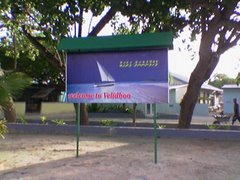In August to November 2007, several islands belonging to the central atolls of the Maldives  experienced a massive fish kill incidents causing a major concern in the country. Thousands of dead fishes were reported washed ashore on the beaches of some islands almost on a daily basis. A research team from Environment Research Centre (ERC) visited the islands and collected water samples and fish samples for analysis.
experienced a massive fish kill incidents causing a major concern in the country. Thousands of dead fishes were reported washed ashore on the beaches of some islands almost on a daily basis. A research team from Environment Research Centre (ERC) visited the islands and collected water samples and fish samples for analysis.
ERC reports that a total of 11 fish samples were collected from three different lagoons in the Atoll. They reveal that visual observations of the samples did not indicate signs of damage or disease. However biopsy/cytology, microscopy, and biochemical analysis of samples belonging to various fish species revealed that the most likely cause of the massive fish kill was due to Aeromonas bacterial infection acquired through the water via the gills. Nutrient concentrations, both inorganic and organic, were highly variable from site to site.
ERC revealed that water quality analysis revealed very high levels of phosphates and nitrates, and ammonia. Dissolved Oxygen (DO) was very low (1.65mg/L) while Chemical Oxygen Demand (COD) level of the samples were very high (2727.4 mg/L)
ERC also pointed that Aeromonas bacterial infection may be actual reason for the mass fish kill that occurred in Maldives last year, as the results of the experiments were based on samples taken from Dhaalu Atoll.
Previously Marine Research Centre (MRC) has revealed that mass fish kill was not due to Algal Bloom or due to low oxygen levels in the waters. MRC has taken samples from Baa, Kaafu and Vaavu atoll, for further analysis.


No comments:
Post a Comment